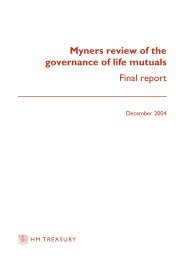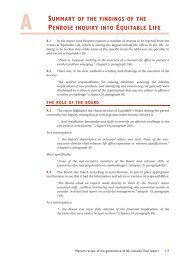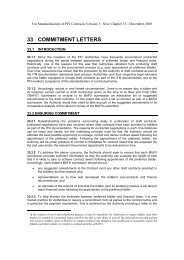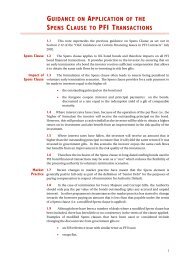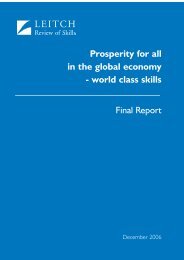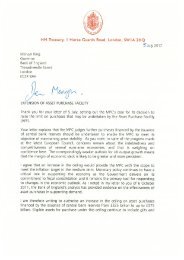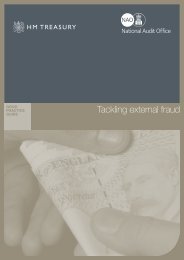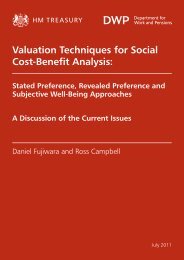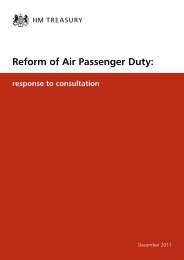4. First case study – the subdivision of the light - HM Treasury
4. First case study – the subdivision of the light - HM Treasury
4. First case study – the subdivision of the light - HM Treasury
You also want an ePaper? Increase the reach of your titles
YUMPU automatically turns print PDFs into web optimized ePapers that Google loves.
F05 Ch4 Subdivision <strong>of</strong> <strong>the</strong> <strong>light</strong>.doc<br />
05/04/2006 19:34:00<br />
Technological roulette <strong>–</strong> a multi-disciplinary <strong>study</strong> <strong>of</strong> <strong>the</strong> dynamics <strong>of</strong> innovation in electrical, electronic<br />
and communications engineering.<br />
<strong>4.</strong> <strong>First</strong> <strong>case</strong> <strong>study</strong> <strong>–</strong> <strong>the</strong> <strong>subdivision</strong> <strong>of</strong> <strong>the</strong> <strong>light</strong><br />
seconds <strong>the</strong>re was not a soul left in <strong>the</strong> meeting. All <strong>of</strong> <strong>the</strong>m, including <strong>the</strong> parson, were<br />
clustered round me, bidding against each o<strong>the</strong>r for copies <strong>of</strong> <strong>the</strong> precious paper.<br />
“You can understand why it struck me <strong>the</strong>n that <strong>the</strong> telegraph must be about <strong>the</strong> best thing<br />
going, for it was <strong>the</strong> telegraphic notices on <strong>the</strong> bulletin boards which had done <strong>the</strong> trick. I<br />
determined at once to become a telegraph operator.”<br />
Clark1977, p11<br />
By a chance <strong>of</strong> fate, Edison was involved in an incident in which <strong>the</strong> infant son <strong>of</strong><br />
J.U. McKenzie, a telegraph operator at Mount Clemens, one <strong>of</strong> <strong>the</strong> stations between<br />
Detroit and Port Huron, was almost killed. Edison heroically snatched <strong>the</strong> lad from <strong>the</strong><br />
path <strong>of</strong> an oncoming rail car. To repay him, McKenzie taught Edison <strong>the</strong> skills <strong>of</strong> a<br />
telegrapher.<br />
At <strong>the</strong> age <strong>of</strong> sixteen, Edison was appointed as an operator in a small telegraph<br />
<strong>of</strong>fice at Port Huron. He had a somewhat casual attitude towards his employment,<br />
however, regarding it as an opportunity to <strong>study</strong>, repeating experiments he had read about<br />
in <strong>the</strong> Scientific American, ra<strong>the</strong>r than giving priority to <strong>the</strong> transmission <strong>of</strong> his customers’<br />
messages.<br />
By <strong>the</strong> end <strong>of</strong> 1863 Edison felt he had learned all he could at Port Huron and moved<br />
on to become a railway operator with <strong>the</strong> Grand Trunk Railroad at Stratford Junction,<br />
about a hundred miles east across <strong>the</strong> Canadian frontier.<br />
At Stratford, Edison worked at night. During <strong>the</strong> day he continued with his<br />
experiments and studies. Edison’s <strong>study</strong> regime meant that he <strong>of</strong>ten fell asleep at his post.<br />
The railway had a monitoring system which required <strong>the</strong> operators to transmit a signal<br />
every hour as an indication that <strong>the</strong>y were awake, but Edison managed to circumvent <strong>the</strong><br />
safety regulations by means <strong>of</strong> a notched wheel, attached to a clock, which made <strong>the</strong><br />
necessary connections and sent out <strong>the</strong> hourly “wide-awake” signal. His downfall was <strong>the</strong><br />
failure to pass on orders to hold a freight train, which, in consequence was nearly involved<br />
in a head-on collision.<br />
In February 1865, Edison moved to Cincinnati to work for Western Union. He<br />
honed his skills and was promoted from “plug” operator to <strong>the</strong> status <strong>of</strong> “first-class man,”<br />
capable <strong>of</strong> receiving press copy for as long as required. With this advancement, his salary<br />
Clark 1977,p19<br />
increased from $80 a month to $125.<br />
107



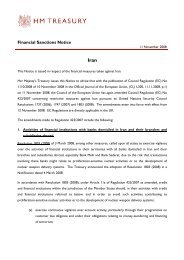
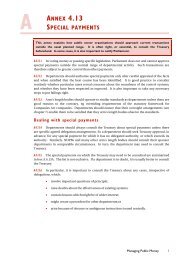
![AIRTO [Professor Dr Brian Blunden] - HM Treasury](https://img.yumpu.com/15492848/1/184x260/airto-professor-dr-brian-blunden-hm-treasury.jpg?quality=85)
